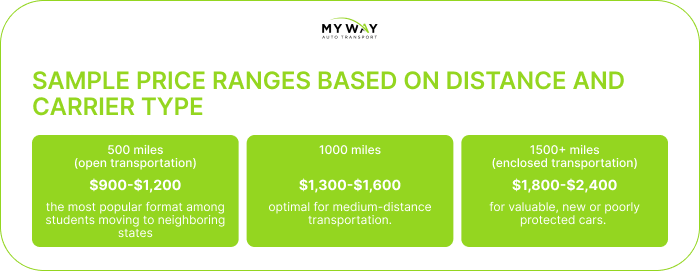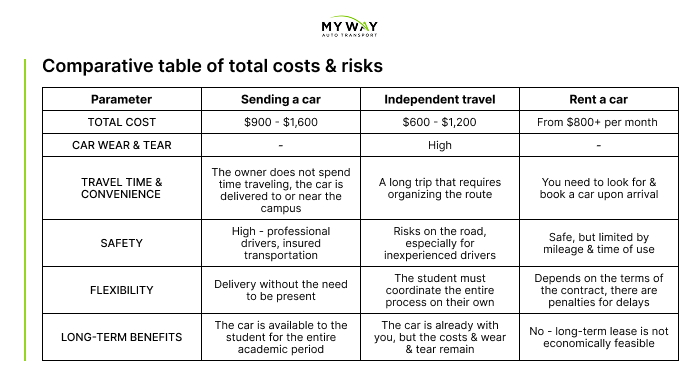Budgeting car shipping into your campus relocation

Considering the logistics and budget when moving to campus is one of the most important parts of preparation for many students and their families. For our part, we offer transparent pricing and affordable student car shipping services, allowing you to avoid unnecessary expenses and focus on your studies.
Why budgeting for car shipping matters in your campus move?
In 2025, the demand for car shipping for students continues to grow, and many students already see this service as an integral part of their move. That is why proper budgeting of car shipping costs is crucial. It allows you to avoid unexpected financial burdens, choose the most favorable tariff and ensure that the vehicle arrives at the new place of residence on time.

Common misconceptions about auto transport costs
One of the main reasons why students postpone the decision to have a car delivered is because of common myths about the cost of this service:
- It's too expensive. Many people think it is easier to buy an inexpensive car locally or rent a vehicle than to pay for transportation. However, the price of transportation for college students is often lower than the cost of buying or renting a car long-term.
- The procedure is complicated and bureaucratized. In fact, modern companies provide a simple online booking procedure, transparent rates and customer support at every stage. All you need to do is choose a route, type of transport, provide car details and you're done.
- There are no safety guarantees. Certified companies are required to have insurance and adhere to strict safety standards. In addition, you always have the right to request a contract and check the carrier's license.
The financial impact of last-minute bookings
Delayed bookings are more common during peak months such as August and early September, when students move to campuses in large numbers before the start of the school year. At this time, demand increases dramatically and the number of available carriers is limited, which automatically raises prices.
In addition, when booking at the last minute, you often have to accept less convenient delivery conditions, such as longer waiting times, a limited choice of transport types (open/closed car) and sometimes additional urgency fees.
In some cases, students run the risk of not finding a carrier at all for the desired date, which can lead to the need to travel independently, additional expenses for gasoline, overnight stays on the road and wear and tear on the car.
Hidden costs students often overlook
One of the most common of these costs is storage fees — if you are unable to pick up the car on time upon arrival, the company may charge you for each day of downtime in the warehouse or parking lot.
Another important factor is cargo insurance. Basic insurance may not cover all possible risks during transportation. If you don't clarify what exactly is included in the insurance, you will have to cover the repair costs yourself in case of damage.
There may also be fees for changing the delivery date. For example, if a student unexpectedly changes their arrival date on campus or their dormitory move-in schedule, rescheduling the date may result in a penalty or recalculation of the rate.
In addition, there are potential additional fees for deliveries to sparsely populated or hard-to-reach areas, as well as for door-to-door services, which, while convenient, are not always included in the standard price.
Estimating your car shipping costs accurately
For most students and their families, the cost of car transportation is one of the key factors that influence the decision whether to send a car to campus or look for an alternative. To avoid budgeting mistakes, you should clearly understand what the price consists of, how it is formed and what tools help you avoid overpayments.
Factors that affect final pricing
The average cost of shipping a student vehicle depends on several variables:
- distance between points;
- type of transportation - students can choose between an open (more affordable option, but the car is exposed to weather conditions) and a closed car carrier (more expensive, but protects the car during transportation);
- seasonality & demand — during peak periods (August-September, end of the semester), tariffs increase due to increased demand for delivery services to campuses;
- location — delivery to large cities is usually cheaper than to remote or rural areas.
Sample price ranges based on distance and carrier type
While rates may vary depending on the specific company, car condition and delivery time, here are some rough price guidelines:
- 500 miles (open transportation): $900-$1,200 — the most popular format among students moving to neighboring states;
- 1000 miles: $1,300-$1,600 — optimal for medium-distance transportation.
- 1500+ miles (enclosed transportation): $1,800-$2,400 — for valuable, new or poorly protected cars.
These figures are based on current market data for 2025 and correspond to student car rates for the most popular destinations.

Using online quote tools effectively
To avoid guesswork and inaccuracies, we recommend using online shipping cost calculators. They allow you to quickly and free of charge estimate the costs, taking into account the individual parameters of the order.
Use the free calculator to find out the current price in just a few minutes. Just enter the route, the type of car and the desired delivery date and the system will automatically generate a detailed estimate.
Get at least 3-5 quotes before making a final decision. This will allow you to compare offers, avoid overpricing and make sure the terms and conditions are transparent.
Budgeting tips for students & their families
Moving to college or university is not only a new stage of life, but also a serious financial commitment. Rational planning allows you to control costs, choose the best deals and maintain financial flexibility during the academic year.
Set a realistic car shipping budget early
Estimate the cost of car delivery for students based on current market rates. But it is also worth considering the costs of:
- basic technical inspection before transportation;
- preparation of the car: cleaning the interior, removing accessories, checking fluids;
- fuel after delivery, if you have to drive the car to the campus yourself;
- potential insurance costs during transportation.
This approach provides a more accurate understanding of the amount you will have to spend and avoids situations when the car arrives and you no longer have money for fuel or insurance.
Consider total relocation expenses (not just the car)
A car is only part of the financial burden. Students and their families should consider other related expenses as well:
- packing & transportation of personal belongings;
- airline tickets or transportation to the place of study;
- rent of housing or dormitory;
- student fees, deposits and educational materials.
Ignoring these expenses leads to exceeding the budget in the first weeks of school.
Create a сost buffer for unexpected fees
In order to have a financial "airbag", it is worth allocating 10-15% of the total budget as a buffer:
- in case of changes in the transportation route;
- delivery delays due to weather conditions or technical problems;
- additional services, such as urgent delivery or temporary storage;
- unexpected expenses in the first days after you arrive on campus.
The sooner you start working on your budget, the more confident you'll feel on your way to campus.

Ways to save on car shipping without cutting corners
Even with a limited budget, students and their families have real ways to reduce the cost of car transportation. Choosing the right time, taking advantage of special offers and group rates will help you optimize the cost of car delivery for students without sacrificing the quality of services. Below are practical tips that you should consider before placing your order.
-
Book during off-peak periods
July, August and early September are the busiest periods, when shipping costs can increase by 20-30%. To avoid higher rates, plan your transportation in May, June or October, when the market is less saturated and carriers are more willing to offer discounts.
-
Ship with friends or classmates (group discounts)
If several students are traveling to the same or neighboring campuses, booking car transportation services together can significantly reduce the cost per participant. Companies often offer group discounts of up to 15% when booking multiple vehicles at the same time. Just get together with your friends or classmates, choose one carrier and ask them to provide a special rate for your group.
-
Ask about student deals & loyalty programs
Many transportation companies offer special rates for students, especially during summer and fall campaigns. Some promotions include a fixed discount, reduced insurance rate or free extras. To take advantage of such offers, be sure to ask about student programs when applying or contact a company representative via the contact form on the website.
Should you ship, drive or rent instead?
Before the start of the school year, students and their families often face a choice: send a car through a carrier, drive themselves or rent a car on the spot.
When driving is (and isn’t) the more economical choice
A car is an economical solution if:
- the campus is located in a suburb or rural area;
- the student plans to go home often for weekends or vacations;
- there is a need to work or do an off-campus internship;
- it's difficult or expensive to get around the city without a car.
A car isn't beneficial if:
- the campus has everything you need within walking distance;
- public transportation is stable and inexpensive;
- the student doesn't plan to travel outside the city or does so extremely rarely;
- on-campus parking is paid or limited.
Local transportation alternatives near campus
University campuses and surrounding areas are increasingly offering convenient and affordable transportation options that can be a viable alternative to a personal car:
- Campus transportation. Many educational institutions organize free or discounted bus routes that connect dormitories, academic buildings, libraries, sports complexes and other important locations. Such transportation operates on a schedule, which allows students to plan their movements in advance.
- Bicycles and electric scooters are a great solution for short distances. In large cities and even smaller campuses, there are often rental shops where you can rent vehicles by the hour or by the day. This is environmentally friendly, economical and often faster than public transportation within the campus.
The best solution is to combine different options based on your individual needs, campus location and schedule.
Don't leave everything to the last moment: preparing your car transportation in advance guarantees better service, the best price and peace of mind during the move. If you are interested in car transportation for students, you can learn more about it in the article. My Way is not just logistics - it is your reliable partner in moving!
Request an instant quote in under 2 minutes
Contact us for a custom delivery quote.

